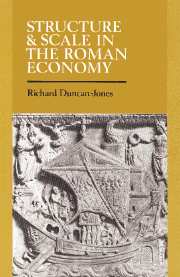Book contents
- Frontmatter
- Contents
- List of figures
- List of tables
- Preface
- List of abbreviations
- Introduction
- PART I TIME AND DISTANCE
- 1 Communication-speed and contact by sea in the Roman empire
- 2 Trade, taxes and money
- 3 Separation and cohesion in Mediterranean trade
- 4 Stability and change
- PART II DEMOGRAPHY AND MANPOWER
- PART III AGRARIAN PATTERNS
- PART IV THE WORLD OF CITIES
- PART V TAX-PAYMENT AND TAX-ASSESSMENT
- Appendices
- Bibliography
- Index
2 - Trade, taxes and money
Published online by Cambridge University Press: 13 October 2009
- Frontmatter
- Contents
- List of figures
- List of tables
- Preface
- List of abbreviations
- Introduction
- PART I TIME AND DISTANCE
- 1 Communication-speed and contact by sea in the Roman empire
- 2 Trade, taxes and money
- 3 Separation and cohesion in Mediterranean trade
- 4 Stability and change
- PART II DEMOGRAPHY AND MANPOWER
- PART III AGRARIAN PATTERNS
- PART IV THE WORLD OF CITIES
- PART V TAX-PAYMENT AND TAX-ASSESSMENT
- Appendices
- Bibliography
- Index
Summary
Introduction
The shortage of information about the volume of ancient trade makes fresh sources of inference worth exploring. Some of the interactions between other elements of the Roman economy may have implications for trade. In one of the most arresting contributions of recent years, Keith Hopkins has argued that long-distance trade grew very considerably during the Roman Principate, under stimuli that were an incidental by-product of Roman rule.
His model notes that the provinces which produced the most tax-revenue were not those which cost the most to govern. Wealthy provinces with small garrisons were probably net exporters of tax-revenue, while less wealthy provinces with large garrisons were probably net importers of tax-revenue. Each time that the tax-cycle took place, the imbalance would tend to drain money out of the tax-exporting provinces, making it more difficult for those provinces to pay their taxes in future. In the model, it is argued that the imbalance was corrected by an increase in production in the ‘tax-exporting’ provinces and by an increase in their exports; that in turn meant an expansion in the volume of long-distance trade within the empire.
Roman authors show some awareness of disparities like those envisaged in the model. Cicero claimed that some of Rome's provinces hardly brought in enough to pay their defence costs. Strabo writing before the Claudian conquest thought he could foresee that Britain would not yield enough tribute to support the cost of one legion.
- Type
- Chapter
- Information
- Structure and Scale in the Roman Economy , pp. 30 - 47Publisher: Cambridge University PressPrint publication year: 1990
- 1
- Cited by



